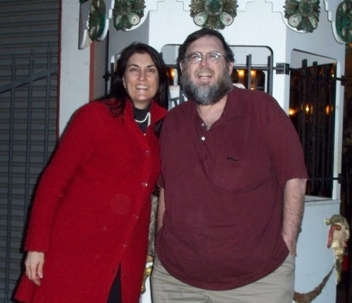“I Am Lucky to Be Alive!”
Michael Winkelman is a 58 year-old patent attorney and chemical engineer who was diagnosed with peritoneal mesothelioma in March of 2003. Michael and his wife Cindy have three grown children and reside in Appleton, Wisconsin.
Mr. Winkelman’s troubles began in December, 2002, when he developed a painful, nonproductive cough, shortness of breath, and fatigue. The fits would leave him drained. He first sought medical attention in December 2002. He went to an immediate care facility where he was initially diagnosed with bronchial pneumonia and prescribed antibiotics with no significant relief of symptoms. In the following months he sought help again and received several different diagnoses. None provided relief of the symptoms.
Approximately one month after his last diagnosis, towards the end of March, 2003 Michael’s wife noticed a lump near his abdomen and insisted they go immediately to the emergency room. At the ER, he was asked if he knew there was blood in his stool. Then he underwent a battery of tests including chest films, CT scans bronchoscopy and colonoscopy. After carefully reviewing the results, the ER doctors suspected malignancies in his abdomen and colon.
The following day, he underwent an exploratory laparotomy; there were two tumors sites located, one in the colon and another site on the abdominal wall.
The larger tumor had invaded the parenchyma. The tumor was indicative of an adenocarcinoma with sarcomatous features. Six regional lymph nodes were tested and found negative for any malignancy. There was a metastic adenocarcinoma present in the peritoneal implant. The specimens were sent to the Mayo Clinic in Rochester, Minnesota for further studies.
At the Mayo clinic, several tests performed on the specimens, including immunoperoxidase studies, found that Michael was suffering from more than one neoplastic process. The larger of the two colonic masses found was a high grade carcinoma with extensive spindle cell differentiation, an epithial neoplasm with extensive sarcomatoid. The small colonic mass appeared to be epithelioid in nature. Testing performed on the peritoneal mass revealed malignant mesothelioma.
Over the next three to four months Michael successfully completed eight–ten chemotherapy treatments utilizing Camprosar (Irinotecan) and Gemzar (Gemcitabine) due to the varieties of the cancers treated.
Michael often thanks God for his colon cancer and the observant eyes of his surgeon who recognized it for what it was and sent the specimen to the Mayo Clinic for confirmation.
“I've had several doctors since then tell me I'm lucky to be alive, and the strange thing is, if it weren't for the colon cancer, I probably wouldn't have found out about the peritoneal meso!”
Due to bi-annual CT scans, in June of 2011, it was discovered that Michael’s colon cancer had returned. He underwent surgery at the end of July, in which 10 inches of his small intestine were removed. In February, 2012, he finished the last of 12 chemotherapy treatments utilizing Oxaliplatin and 5 –FU (Fluorouracil). About half-way through his chemo treatment, Michael began experiencing sharp chest pains; he thought he had pulled a chest muscle. Michael’s doctors performed a CT scan which showed that Michael had a pleurisy and a spot beneath his right breast. The pleurisy went away and the chemo appears to be necrotizing the spot. He is scheduled for another CT scan at the end of March, 2012.
With a hearty sigh, Michael states “7 1/2 years with no cancer signs and it comes back. But I'm still here!! And I still have my hair!
Michael joined the Live Strong program which helps cancer patients through support, exercise and healthy eating. He is still recovering from his recent chemo treatments which were harder on him than his chemo back in 2003. He looks forward to the warmer weather and being able to do more walking and exploring local trails near his home.
He remains very appreciative of the Worthington Law firm, stating that “The settlements thru them have been a major help as I've not worked fulltime since the first diagnosis in 2003.”
Stay strong Michael!
Posted on March 9, 2012

